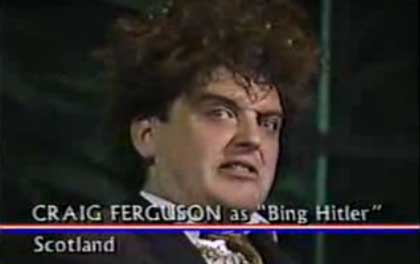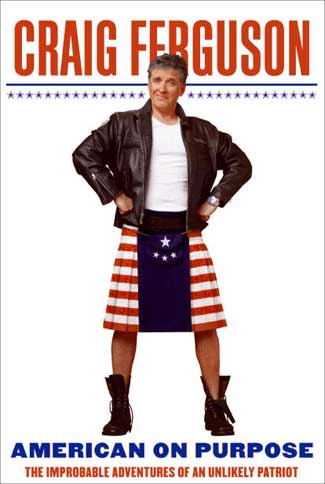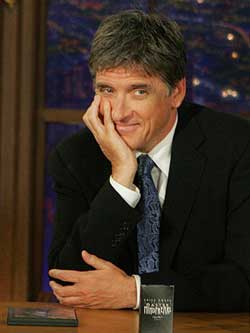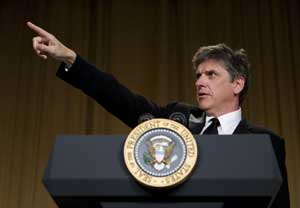
Craig Ferguson's autobiography hits stores next week -- and his
American on Purpose, subtitled
The Improbable Adventures of an Unlikely Patriot,vaults instantly to the top of its narrow but rarefied genre: it's the best memoir ever written by a late-night talk-show host.
And if that doesn't sound like high enough praise, it's meant as quite the compliment...

Johnny Carson, who had decades of fabulous inside stories to tell, never told them between the pages of a book. But Steve Allen, the original host of the Tonight! show, turned out tons of them, almost as prolifically as he wrote songs. But his books, at least the ones about his own life and career, seemed dictated as much as written. Jack Paar, who succeeded Allen on Tonight, had a conversational writing style in his memoirs, too, but both its style and content were up a few notches.
Other prominent late-night show hosts have either been notoriously silent in terms of autobiography (David Letterman, Conan O'Brien), or have worked with co-authors (Dick Cavett). But Ferguson, who already has penned movies and a novel (2007's entertaining Between the Bridge and the River), is as much a writer as a standup comic or TV host.
In American on Purpose, which you can buy at a substantial discount by clicking HERE, he proves it -- on almost every page.
Ferguson has the detachment to see his past without apologies or nostalgia, and the literary talent to make memorable observations about the various triumphs and mistakes in his life, and the environments around him.
As a "plump" young boy getting the chance to travel from his native Scotland to the United States for the first time, he recalls the simple thrill of getting his passport ("I felt like James Bond"). He remembers the time, while running from a gang of kids intending to do him harm, he came within a few yards of being flattened by a railroad train ("I still have dreams where I see the driver's face").
 And he talks candidly of the early experiences with religion-generated violence that formed his political viewers as a young teen: "I believe in a constitution which separates church from state," Ferguson writes. "I've seen what happens when they get in cahoots."
And he talks candidly of the early experiences with religion-generated violence that formed his political viewers as a young teen: "I believe in a constitution which separates church from state," Ferguson writes. "I've seen what happens when they get in cahoots."
Ferguson's story is compelling enough on his own: his rambling path from construction work and odd jobs (including being a bouncer at a club) to acting and comedy, his alcohol and drug-fueled "Lost Weekend" that lasted more than a decade, and his often tempestuous relationships with friends and lovers.
One genuinely entertaining, and genuinely nice, aspect of Ferguson's writing is that, while he is very hard on himself throughout the book, he is quite forgiving of others. In Hollywood memoirs, not many ex-lovers and ex-wives get off as easily, or are recalled as fondly.
He's also got some very vivid show-biz stories, from doing standup as a bellowing character he called Bing Hitler to getting cast as the ineffectual boss on The Drew Carey Show. But Ferguson downplays most of his skills and achievements, except for the times when he himself is shocked by how far he's come. He admits this feeling readily, whether he's taking his parents to the Grand Canyon or hosting the White House Correspondents' Dinner, with President Bush as the guest of honor.
But it's the writing that gets me -- the way he writes so lovingly about an uncle, "Gunka James" -- and, as well, about his son, Milo, and about his parents. Long-time viewers of The Late Late Show with Craig Ferguson on CBS surely remember the stunningly emotional and honest show in which Craig reacted to the death of his father. After reading American on Purpose, you'll get an even better sense of what a loss that was, and his mother's death as well.
 In fact, this autobiography, while being the opposite of boastful, manages to explain a lot. It explains how Ferguson developed the gifts that allow him to improvise, night after night, the most entertaining and unpredictable monologue on television. It explains why he puts such a premium on friendship, why he became such a voracious reader and readable writer, and, most germane to the book's title, why he sought, and is so proud of, his American citizenship.
In fact, this autobiography, while being the opposite of boastful, manages to explain a lot. It explains how Ferguson developed the gifts that allow him to improvise, night after night, the most entertaining and unpredictable monologue on television. It explains why he puts such a premium on friendship, why he became such a voracious reader and readable writer, and, most germane to the book's title, why he sought, and is so proud of, his American citizenship.
The only flaw with American on Purpose, as I see it, is that HarperCollins made the painful error of accidentally omitting Craig's acknowledgments at the end of the book. Ouch. Even though Ferguson announced that on his show, and mined it for humor, every author can imagine what a sinking feeling that must have caused.
So here's the deal, Craig: If you want to send your acknowledgments to TV WORTH WATCHING, we'll print them here, in full. For your memoir, as well as your place in American TV history, you've more than earned it.